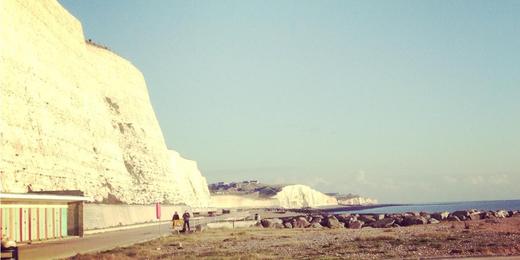 I’m always fascinated by how other people work and achieve the stuff they think is important in life. That’s why I love sites like The Setup and the ‘This Is How I Work’ series of blog posts on Lifehacker and Dai Barnes’ blog.
I’m always fascinated by how other people work and achieve the stuff they think is important in life. That’s why I love sites like The Setup and the ‘This Is How I Work’ series of blog posts on Lifehacker and Dai Barnes’ blog.
I’ve decided to start an occasional series that does something similar but includes an audio element (an ‘interview’, if you will) including a little more context than you usually get.
This inaugural post features Eugenie Teasley (@eugenieee), who I came across earlier this year. She’s one of the most enthusiastic, smart, lovely, honest, talented people you could ever hope to meet. And, therefore, the perfect person to kick off the series!
[display_podcast]
Can’t see the embedded audio player above? Click here!
(you can subscribe to the series as a podcast by using this feed)
So who are you, then?
I run Spark+Mettle, an aspirations agency that equips people with the 21st century skills — character strengths, soft skills and networks — needed to succeed in work and life. We primarily work with marginalised 18–24 year olds, but we like involving everyone in what we do. We like co-creating stuff with the people we work with, and Robin-Hooding people’s digital habits to turn them into something productive and meaningful. I live just up from the beach in Brighton with my husband, son and two dogs. And often various Europeans coming to learn English. On weeks like this, there’s almost nowhere better to be. In England.
And how very well are you?
I’m okay. I’m about to go on holiday for the first time this year, which is a big deal. It’s nowhere grand, just a beach in Norfolk. But there’s sea and sand and, quite possibly, sun. And seals. The last ten weeks or so have been a bit nuts, workwise, so it feels pretty exciting. I hate people who talk about how busy they are, which means I hate myself right now. I am so busy. In Norfolk I might go do something crazy, like read a book.
What are you up to at the moment?
I’ve been spending a lot of time with Excel, and we are not natural companions. But I’ve been revising the business plan for a platform we launched earlier this year, Discoverables, as well as applying for various pots of funding. It’s meant a lot of time on trains, in coffee shops, in meetings, with figures and goals and projections dancing around my head. To wind down I’ve been getting myself hooked on House of Cards, running along the seafront, and reading ‘Frog and Toad’ stories to my kid. They are the greatest stories. There’s one called The Kite which is maybe the best story about grit, determination or “mettle” that I’ve ever read.
Have you come across anything/done anything that’s really had an impact on the way you work?
Last year I met a man called Graham Allcott, founder of Think Productive, and author of How To Be A Productivity Ninja. I read his book as soon as it was published and it really motivated me to organise my life better, especially my inbox. It’s a fantastic, fantastic book. Hugely enjoyable as well as helpful. I now like getting my inbox to zero most days. He also was one of the inspirations behind the #Flourish40 experiment I did earlier this year, focusing on real, easy ways to be a better version of myself in a short amount of time. One of those actions included only spending one hour a day on email, and ditching screens before 9am and after 6pm, for six weeks. I haven’t stuck to them now, but I have greatly reduced my email/screen time. It makes me feel human. That and Asana. I work remotely and on lots of different projects with lots of different people, so it’s insanely useful.
Who really inspires you?
Over the past couple of years I’ve been most inspired by the quietly extraordinary humans I’ve encountered in amongst all the noise of start-uppers and social enterpreneurs and such. People like Cassie Robinson, who’s got a super cool project called LondonScape. And then there’s Hannah Smith, who is currently on a Winston Churchill Memorial Trust trip researching social entrepreneurship networks in New Zealand. They are people who are infinitely generous with their time, brains and contacts. And then there are the women I work with: Kazvare Shire and Arfah Farooq. They make things happen, are self-reliant and have smarts like no other. I’m also constantly inspired by my own, old ma — who somehow seemed to get the balance between working furiously at what she loved and raising an incredibly happy and secure family in a way that makes me want to emulate her approach day on day. It’s something I am far from nailing.
Apart from your phone, which piece of tech would you not be without?
It would have to be my Nike Fuelband. I’ve had it since November and it’s totally transformed my daily life and activities. The psychology is so simple: I now pretty much always walk to the station, for example, rather than get a bus because it will earn me points. I’m naturally competitive and not naturally sporty, so it gives me an opportunity to compete primarily against myself. Perfect. Saying that, I have one friend I’m connected to on it as well, and if he’s ahead of me then it will inspire me to go for a run. A couple of weeks ago I logged my hundredth run through the Nike Run app, and that made me feel so proud of what I’ve done in under a year (this time last summer I was out-waddled by a duck). It boosts my vitality, my spark, my mettle, my self-esteem, my sense of agency… so many of the character strengths I bang on about as being the components of flourishing.
And finally, who would you like to see answer these questions?
There’s a games guy called Mark Sorrell (@sorrell) who seems like a super smart cookie. I think Cassie Robinson is ace and what she’s doing with LondonScape /Data Store is so cool (@cassierobinson). Dilesh Lalloo is director of Pixelgroup and is always doing neat things (currently working on a Mills & Boon website :-)), @hoxtontweet). And then Pedram Parasmand (@pedagogicalped) works at Teach First but is co-founder of the Skills Lab and always knows the most fascinating things about education, and is increasingly interested in digital ed too. Finally Alison Coward (@alisoncoward) is the queen of creative collaboration and I always love knowing what is inside her head. Oh and Kieron Kirkland of Nominet (@kieronkirkland). He’s doing really interesting and clever things around impact evaluation of digital projects.
Great stuff! Big thanks to Eugenie for giving up part of her holiday to talk to me. If you haven’t already (ahem) discovered Discoverables I really would give it a try. It’s awesome. 🙂




